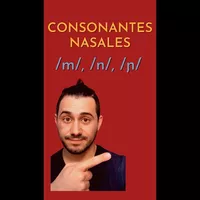Consonantes NASALES /m/, /n/, /ɲ/ - (Reels)
todos los sonidos en español hoy la m la
primera de las consonantes nasales tiene
dos variedades la más común es y se
pronuncia juntando los labios para que
el aire no pueda seguir por la boca
entonces el velo del paladar baja para
que el aire salga por la nariz pero ante
una efe se pronuncia como que es lo
mismo de antes pero juntando el labio
inferior con los dientes superiores
práctica conmigo la n en francia se
enfoca en función de las damas enfermas
emparejadas siguen todos los sonidos en
español hoy el fonema aún más confuso la
m enviar ánfora encía antes ancha
cónyuge rincón y enjuto se escriben con
él pero todas se pronuncian diferente la
n y la n se fusionan con la consonante
siguiente cuando están al final de las
islas este fenómeno se llama asimilación
y probablemente también ocurre en tu
lengua con otras consonantes sigue meses
ha aprendido algo todos los sonidos en
español hoy la n es el fonema menos
común en español es decir el que se
pronuncia con menos frecuencia se
pronuncia pegando toda la lengua el
paladar duro apunta a los incisivos
inferiores el aire sale por la nariz y
suena así niña en práctica conmigo el
'new del niño daña a la niña niña con
una piña todo el año sigue un mes y te
gusta el español

